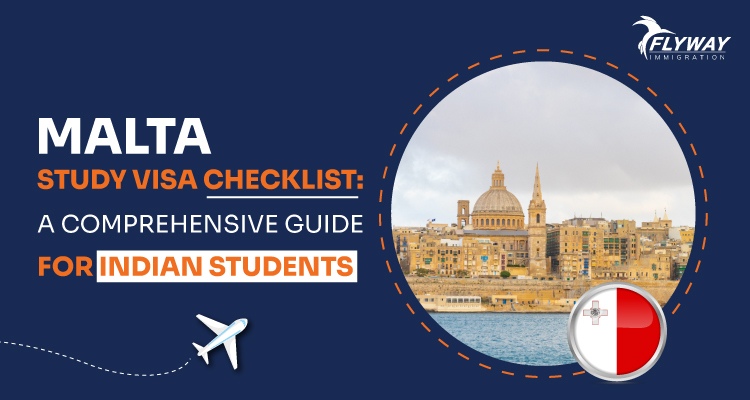
Reasons for Ireland Student Visa Rejection in 2024
28 March 2024
Top High-Paying Jobs in Canada for 2024
2 May 2024Are you an Indian student dreaming of pursuing higher education in the beautiful Mediterranean island nation of Malta?
With its world-class universities, affordable tuition fees, and vibrant multicultural environment, Malta has become an increasingly popular study destination for international students.
However, before you pack your bags, you need to understand the process of securing your Malta study visa.
Fortunately for you, we're here to guide you through every step with this comprehensive blog post. From understanding the different visa types to gathering the required Malta student visa documents, we've covered it all.
Let’s jump in.
Types of Malta Student Visas for Indians
When it comes to studying in Malta, Indian students have two main visa options — the Schengen Type D Visa (National Visa) and the Schengen Type C Visa (Short-stay Visa).
1. Schengen Type D Visa
The Schengen Type D Visa, also known as the National Visa, is the visa you'll need if you're planning to study in Malta for more than 90 days.
With this visa, you can live in Malta for as long as your course lasts. You can also travel to other countries in the Schengen area for up to 90 days while your visa is still valid.
To be eligible for the Type D Visa, you must have been accepted into a recognized educational institution in Malta and have the necessary financial means to support your studies and living expenses.
2. Schengen Type C Visa
If your course in Malta is shorter than 3 months (90 days), you'll need to get a specific type of visa called the Schengen Short-stay Visa or Type C visa. This visa allows you to stay in Malta and other Schengen countries for up to 90 days within a 6-month (180-day) period.
Keep in mind that the Type C Visa is not suitable for long-term studies, and you'll need to apply for a different visa if you plan to extend your stay beyond 90 days.
Benefits of Malta Student Visa
Before we dive into the details of Malta study visa requirements, let's take a moment to appreciate the benefits of studying in Malta with a valid student visa:
- Access to Quality Education — Malta is home to several renowned universities and colleges, offering a wide range of courses at affordable tuition fees.
- Multicultural Experience — As an international student, you'll have the opportunity to immerse yourself in a diverse cultural environment, broadening your horizons and making lifelong connections.
- Mediterranean Lifestyle — Malta boasts a rich history, stunning beaches, and a vibrant Mediterranean lifestyle, making it an ideal destination for personal growth and exploration.
- Safe and Welcoming Environment — Malta is known for its safe and welcoming attitude towards international students, allowing you to focus on your studies without worries.
- Post-Study Work Opportunities — Depending on your course and visa type, you may be eligible to apply for post-study work opportunities in Malta or other European countries.
- Gateway to Europe — With its strategic location in the heart of the Mediterranean, Malta serves as a gateway to exploring other European countries during your study breaks.
Malta Student Visa Requirements for Indian Citizens
Now that you're aware of the visa options and the benefits of studying in Malta, let's dive into the specific Malta study visa requirements for Indian citizens.
Acceptance Letter
The foundation of your Malta student visa application is the acceptance letter from a recognized educational institution in Malta.
This letter serves as proof that you have been accepted into a legitimate course and meet the eligibility criteria for a student visa.
To obtain this letter, you'll need to apply to the institution of your choice and provide the necessary documents such as academic transcripts, English proficiency test scores (if required), and any other supporting materials.
Once your application is approved, the institution will issue an acceptance letter, which you'll need to include in your visa application.
Financial Means
Another crucial requirement for a Malta study visa is demonstrating that you have sufficient financial means to cover your tuition fees, living expenses, and other costs associated with studying in Malta.
The authorities will want to ensure that you have access to funds to support yourself during your stay and not become a financial burden on the country.
Acceptable documents to prove your financial means include:
- Bank statements (personal or sponsored) showing a minimum balance as per the visa requirements
- Scholarship letters or sponsorship letters from recognized organizations
- Financial guarantees or loans specifically for the purpose of studying in Malta
It's important to note that the minimum financial requirements may vary based on the duration of your course and your living arrangements.
Malta Study Visa Document Checklist
Now that you understand the key requirements, it's time to gather all the necessary documents for your Malta student visa application.
Here's a comprehensive checklist to ensure you have everything in order:
1. Valid Passport — Your passport needs to be valid for at least 3 months after the date you plan to leave Malta. It should also have at least 2 empty pages for visa stamps.
2. Application Form — You'll need to fill out the apply for malta visa application form accurately and completely. This form can typically be obtained from the VFS Malta website or the Maltese embassy/consulate in your city.
3. Passport Photos — You'll need recent passport-sized photos for your visa application. These photos have to follow certain rules, like the size, background color, and facial expression.
4. Acceptance Letter — As mentioned earlier, the acceptance letter from a recognized educational institution in Malta is a critical component of your application. Double-check that the letter includes all the necessary details, such as your course information, duration, and tuition fees.
5. Financial Proof — Gather all the relevant documents to prove your financial means, such as bank statements, sponsorship letters, or scholarship confirmations.
6. Health Insurance — You'll need to provide proof of adequate health insurance coverage for the duration of your stay in Malta. Many educational institutions offer health insurance plans for international students, or you can purchase a separate policy.
7. Proof of Accommodation — Depending on the visa requirements, you may need to provide proof of accommodation in Malta, such as a rental agreement or a letter from your educational institution confirming your on-campus housing arrangements.
8. Schengen Visa Fee Payment — There is a non-refundable visa application fee that you'll need to pay at the time of submitting your application. The fee amount may vary, so be sure to check the official guidelines.
9. Travel Itinerary — You'll need to provide your travel itinerary, including flight reservations or a detailed travel plan, to demonstrate your intended travel dates and routes.
10. Other Supporting Documents — Depending on your individual circumstances, you may need to provide additional supporting documents, such as academic transcripts, birth certificates, marriage certificates (if applicable), and criminal record certificates. If you have any gaps in your education or employment history, be prepared to provide explanation letters as well.
Malta Student Visa Application Process
Now that you have a clear understanding of the Malta study visa requirements and the necessary documents, let's walk through the step-by-step application process:
Step 1 — Registration
The first step in your journey to study in Malta is registering with a university or educational institution that offers the program you're interested in.
Malta has a diverse range of courses to choose from, including aviation, business studies, humanities, languages, social and behavioral sciences, education and teaching, tourism, and agriculture.
So, it’s important to take your time to research the different universities and programs to find the one that aligns best with your academic goals and interests.
Step 2 — University and Course Selection
Once you've identified a few potential universities and programs, it's time to dive deeper and make your selection.
At this stage, you need to carefully review each program's curriculum, course offerings, faculty credentials, and any specializations or concentrations that pique your interest.
Most importantly, don't hesitate to reach out to the university's admissions office or current students to get a better understanding of the academic environment and campus life.
Step 3 — Prepare Required Documents
With your university and program selected, you'll need to gather all the required documents for your application.
This typically includes your passport, academic transcripts (10th grade, 12th grade, diploma, and degree certificates), a letter of recommendation, an English proficiency certificate (such as IELTS or PTE), a passport-sized photograph, and an updated CV or resume.
Before submission, it’s recommended to double-check the specific requirements for your chosen university and program to ensure you have everything prepared accurately.
Step 4 — Submit Application
Now it's time to submit your application! Most universities offer online application portals, making the process convenient and streamlined.
Be sure to carefully review and proofread your application before submitting it, as any errors or omissions could delay the process or even result in a rejection.
Step 5 — University Interview (Optional)
Some universities may require you to attend an interview as part of the admission process.
This is a great opportunity for you to showcase your passion for the program, highlight your unique qualifications and experiences, and demonstrate why you would be an excellent addition to their student body.
Just make sure that you’re prepared well, dressed professionally, and have practiced answering common interview questions to present yourself in the best possible light.
Step 6 — Receive Offer Letter
After the university has reviewed your application (and conducted an interview, if applicable), you'll receive an offer letter if you've been accepted into the program.
This is an exciting milestone in your journey, but there are still a few more steps to complete before you can officially start your studies in Malta.
Step 7 — Fees Payment
With your offer letter in hand, you'll need to make the necessary fee payments to secure your spot in the program.
This typically includes a registration fee, application fee, service fee for sharing the offer letter, tuition fees (which can vary depending on the program and level of study), insurance fees, and any applicable consultation fees.
So, be sure to factor in these expenses as part of your overall budget for studying in Malta.
Step 8 — Get Final Invitation Letter
Once your fees have been paid, the university will issue you a final invitation letter. This document is crucial for your next step: applying for your student visa.
Step 9 — Apply for the Visa
With your final invitation letter and all the required documents, you can now initiate the process of applying for your student visa.
The Maltese authorities will review your application and supporting materials to ensure you meet the eligibility requirements for studying in the country. Be prepared to provide additional information or documentation if requested.
Step 10 — Get the Student Visa
If your student visa application is approved, you'll receive your student visa, which will allow you to officially enter and study in Malta.
Congratulations! You're now one step closer to embarking on an exciting academic journey in this beautiful Mediterranean island nation.
Remember, throughout this process, you can seek guidance and support from educational consultants and immigration experts like Flyway Immigration. They can provide valuable insights, ensure your application is error-free, and help you navigate any potential roadblocks or challenges that may arise.
Conclusion
Finally, you've made it to the end of this comprehensive guide on how to obtain a Malta study visa as an Indian student. By now, you should have a clear understanding of the requirements and the necessary documents to prepare.
Remember, the key to a successful visa application is being organized and following the instructions carefully.
If you’re still struggling to understand the process and need an expert’s consultation, contact Flyway Immigration.
We are a team of experienced immigration consultants who specialize in helping students like you navigate the complexities of obtaining study visas for various countries, including Malta. Our experts will guide you through every step, ensuring that your application is complete and accurate.
With Flyway Immigration by your side, you'll have the confidence and guidance necessary to secure your visa successfully.


